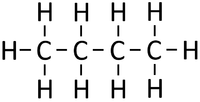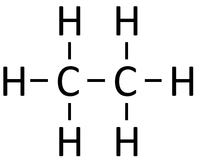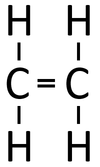Difference between revisions of "Cracking"
(Created page with "==Key Stage 4== ===Meaning=== Cracking is a Thermal Decomposition process in which large hydrocarbon molecules are broken into smaller hydrocarbon molecu...") |
|||
| (8 intermediate revisions by 2 users not shown) | |||
| Line 13: | Line 13: | ||
|- | |- | ||
|[[File:StructuralDiagramButane.png|center|200px]] | |[[File:StructuralDiagramButane.png|center|200px]] | ||
| − | |[[File:ArrowRight.png|center| | + | |[[File:ArrowRight.png|center|100px]] |
|[[File:StructuralDiagramEthane.png|center|200px]] | |[[File:StructuralDiagramEthane.png|center|200px]] | ||
| − | |[[File: | + | |[[File:Addition.png|center|100px]] |
| − | |[[File:StructuralDiagramEthene.png|center| | + | |[[File:StructuralDiagramEthene.png|center|100px]] |
|- | |- | ||
| − | | style="height:20px; width:200px; text-align:center;" | | + | | style="height:20px; width:200px; text-align:center;" |If [[butane]] were '''cracked'''. |
| | | | ||
| − | |colspan="3 | + | |colspan="3"|An [[alkane]] and an [[alkene]] are [[Product|produced]]. |
|} | |} | ||
| + | |||
| + | [[Cracking]] a [[hydrocarbon]] can [[product|produce]] many possible [[product]]s: | ||
| + | |||
| + | Hexadecane → Decane + Hexene | ||
| + | : <chem>C16H34 -> C10H22 + C6H12</chem> | ||
| + | |||
| + | Hexadecane → Decane + Butene + Ethene | ||
| + | : <chem>C16H34 -> C10H22 + C4H8 + C2H4</chem> | ||
| + | |||
| + | Decane → Pentane + Pentene | ||
| + | : <chem>C10H34 -> C5H12 + C5H10</chem> | ||
| + | |||
| + | Decane → Hexane + Butene | ||
| + | : <chem>C10H34 -> C6H14 + C4H8</chem> | ||
| + | |||
| + | ===References=== | ||
| + | ====AQA==== | ||
| + | |||
| + | :[https://www.amazon.co.uk/gp/product/1782945598/ref=as_li_tl?ie=UTF8&camp=1634&creative=6738&creativeASIN=1782945598&linkCode=as2&tag=nrjc-21&linkId=ad276ad49df77ab4b40ab4fd0fe09814 ''Cracking (of hydrocarbons), page 149, GCSE Combined Science; The Revision Guide, CGP, AQA ''] | ||
| + | :[https://www.amazon.co.uk/gp/product/1782945962/ref=as_li_tl?ie=UTF8&camp=1634&creative=6738&creativeASIN=1782945962&linkCode=as2&tag=nrjc-21&linkId=476bb5c8d1dfb5c08ac81b6d4d1c98d8 ''Cracking (of hydrocarbons), page 226, 227, GCSE Chemistry, CGP, AQA ''] | ||
| + | :[https://www.amazon.co.uk/gp/product/1782945571/ref=as_li_tl?ie=UTF8&camp=1634&creative=6738&creativeASIN=1782945571&linkCode=as2&tag=nrjc-21&linkId=9e29fad914244909903e5e93f8a01d96 ''Cracking (of hydrocarbons), page 77, GCSE Chemistry; The Revision Guide, CGP, AQA ''] | ||
| + | :[https://www.amazon.co.uk/gp/product/178294639X/ref=as_li_tl?ie=UTF8&camp=1634&creative=6738&creativeASIN=178294639X&linkCode=as2&tag=nrjc-21&linkId=51599bb45a2bfaf7c1b6a978b2ca2616 ''Cracking (of hydrocarbons), pages 194, 195, GCSE Combined Science Trilogy; Chemistry, CGP, AQA ''] | ||
| + | :[https://www.amazon.co.uk/gp/product/1471851362/ref=as_li_tl?ie=UTF8&camp=1634&creative=6738&creativeASIN=1471851362&linkCode=as2&tag=nrjc-21&linkId=7d78d70a2044ee9982dae010c94af92a ''Cracking, pages 147-8, GCSE Combined Science Trilogy 2, Hodder, AQA ''] | ||
| + | :[https://www.amazon.co.uk/gp/product/0198359381/ref=as_li_tl?ie=UTF8&camp=1634&creative=6738&creativeASIN=0198359381&linkCode=as2&tag=nrjc-21&linkId=47c8d1ae58d8b3a5e2094cd447154558 ''Cracking, pages 154-55, GCSE Chemistry; Third Edition, Oxford University Press, AQA ''] | ||
| + | :[https://www.amazon.co.uk/gp/product/1471851346/ref=as_li_tl?ie=UTF8&camp=1634&creative=6738&creativeASIN=1471851346&linkCode=as2&tag=nrjc-21&linkId=3ac654f4b0da781c49c855a1af4c92ea ''Cracking, pages 176-7, GCSE Chemistry, Hodder, AQA ''] | ||
| + | :[https://www.amazon.co.uk/gp/product/0008158762/ref=as_li_tl?ie=UTF8&camp=1634&creative=6738&creativeASIN=0008158762&linkCode=as2&tag=nrjc-21&linkId=a0fffa35b3ea49a63404f6704e0df7cc ''Cracking, steam, page 236, GCSE Chemistry; Student Book, Collins, AQA ''] | ||
| + | :[https://www.amazon.co.uk/gp/product/0008158762/ref=as_li_tl?ie=UTF8&camp=1634&creative=6738&creativeASIN=0008158762&linkCode=as2&tag=nrjc-21&linkId=a0fffa35b3ea49a63404f6704e0df7cc ''Cracking; catalytic, page 236-7, GCSE Chemistry; Student Book, Collins, AQA ''] | ||
| + | |||
| + | ====Edexcel==== | ||
| + | |||
| + | :[https://www.amazon.co.uk/gp/product/1782945741/ref=as_li_tl?ie=UTF8&camp=1634&creative=6738&creativeASIN=1782945741&linkCode=as2&tag=nrjc-21&linkId=30da4f2178da182547b62a7329d13b57 ''Cracking, page 140, GCSE Combined Science; The Revision Guide, CGP, Edexcel ''] | ||
| + | :[https://www.amazon.co.uk/gp/product/1292120193/ref=as_li_tl?ie=UTF8&camp=1634&creative=6738&creativeASIN=1292120193&linkCode=as2&tag=nrjc-21&linkId=572df39392fb4200db8391d98ae6314e ''Cracking, page 274, GCSE Combined Science, Pearson Edexcel ''] | ||
| + | :[https://www.amazon.co.uk/gp/product/1782945725/ref=as_li_tl?ie=UTF8&camp=1634&creative=6738&creativeASIN=1782945725&linkCode=as2&tag=nrjc-21&linkId=694be7494de75af3349537d34e13f7f0 ''Cracking, page 90, GCSE Chemistry; The Revision Guide, CGP, Edexcel ''] | ||
| + | :[https://www.amazon.co.uk/gp/product/1292120215/ref=as_li_tl?ie=UTF8&camp=1634&creative=6738&creativeASIN=1292120215&linkCode=as2&tag=nrjc-21&linkId=8f96ddb76196848bafdb124354e4cf77 ''Cracking, pages 160, 190, GCSE Chemistry, Pearson, Edexcel ''] | ||
| + | :[https://www.amazon.co.uk/gp/product/1782948147/ref=as_li_tl?ie=UTF8&camp=1634&creative=6738&creativeASIN=1782948147&linkCode=as2&tag=nrjc-21&linkId=f63dcd8345f4e49c717b39a228a36c7c ''Cracking, pages 262, 263, GCSE Chemistry, CGP, Edexcel ''] | ||
| + | |||
| + | ====OCR==== | ||
| + | :[https://www.amazon.co.uk/gp/product/1782945695/ref=as_li_tl?ie=UTF8&camp=1634&creative=6738&creativeASIN=1782945695&linkCode=as2&tag=nrjc-21&linkId=ceafcc80bcad6b6754ee97a0c7ceea53 ''Cracking, page 143, Gateway GCSE Combined Science; The Revision Guide, CGP, OCR ''] | ||
| + | :[https://www.amazon.co.uk/gp/product/1782945679/ref=as_li_tl?ie=UTF8&camp=1634&creative=6738&creativeASIN=1782945679&linkCode=as2&tag=nrjc-21&linkId=a2db42f7b4bdf10cafaafa3bb9120940 ''Cracking, page 94, Gateway GCSE Chemistry; The Revision Guide, CGP, OCR ''] | ||
Latest revision as of 01:07, 4 December 2019
Contents
Key Stage 4
Meaning
Cracking is a Thermal Decomposition process in which large hydrocarbon molecules are broken into smaller hydrocarbon molecules.
About Cracking
- Cracking is often done because Crude Oil contains more large hydrocarbon molecules than can be used and not enough short hydrocarbon molecules than are needed.
- When Crude Oil fractions are cracked the long alkanes are broken down into smaller alkanes and alkenes.
- Cracking is done at very high temperatures (500°C) and uses either a catalyst to aid the reaction or steam.
- When an alkane is cracked into smaller pieces there are not enough Hydrogen [[atom]s to produce two saturated hydrocarbons. One of the hydrocarbons must be unsaturated and therefor will have a double bond.
Examples
| If butane were cracked. | An alkane and an alkene are produced. | |||
Cracking a hydrocarbon can produce many possible products:
Hexadecane → Decane + Hexene
- <chem>C16H34 -> C10H22 + C6H12</chem>
Hexadecane → Decane + Butene + Ethene
- <chem>C16H34 -> C10H22 + C4H8 + C2H4</chem>
Decane → Pentane + Pentene
- <chem>C10H34 -> C5H12 + C5H10</chem>
Decane → Hexane + Butene
- <chem>C10H34 -> C6H14 + C4H8</chem>
References
AQA
- Cracking (of hydrocarbons), page 149, GCSE Combined Science; The Revision Guide, CGP, AQA
- Cracking (of hydrocarbons), page 226, 227, GCSE Chemistry, CGP, AQA
- Cracking (of hydrocarbons), page 77, GCSE Chemistry; The Revision Guide, CGP, AQA
- Cracking (of hydrocarbons), pages 194, 195, GCSE Combined Science Trilogy; Chemistry, CGP, AQA
- Cracking, pages 147-8, GCSE Combined Science Trilogy 2, Hodder, AQA
- Cracking, pages 154-55, GCSE Chemistry; Third Edition, Oxford University Press, AQA
- Cracking, pages 176-7, GCSE Chemistry, Hodder, AQA
- Cracking, steam, page 236, GCSE Chemistry; Student Book, Collins, AQA
- Cracking; catalytic, page 236-7, GCSE Chemistry; Student Book, Collins, AQA
Edexcel
- Cracking, page 140, GCSE Combined Science; The Revision Guide, CGP, Edexcel
- Cracking, page 274, GCSE Combined Science, Pearson Edexcel
- Cracking, page 90, GCSE Chemistry; The Revision Guide, CGP, Edexcel
- Cracking, pages 160, 190, GCSE Chemistry, Pearson, Edexcel
- Cracking, pages 262, 263, GCSE Chemistry, CGP, Edexcel



